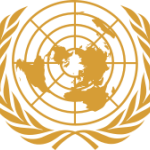- Branche: NGO
- Number of terms: 31364
- Number of blossaries: 0
- Company Profile:
The United Nations Organization (UNO), or simply United Nations (UN), is an international organization whose stated aims are facilitating cooperation in international law, international security, economic development, social progress, human rights, and the achieving of world peace.
Conversion of solid wastes into useful products, for example, composting organic waste to make soil conditioners, and separating aluminium and other metals for melting and recycling.
Industry:Environment
Generally broad portion of a river or stream near its outlet that is influenced by the marine water body into which it flows. The demarcation line is generally the mean tidal level.
Industry:Environment
Natural assets (raw materials) occurring in nature that can be used for economic production or consumption. See also renewable natural resources and non-renewable natural resources.
Industry:Environment
Total weight of all materials, including fuels, introduced into a manufacturing process. It is used to calculate the allowable rate of emission of pollutant matter from the process.
Industry:Environment
Catch allowed to be taken from a stock by a fishery during a specified time period. It is often allocated explicitly amongst those having access rights to the stock. See also quota.
Industry:Environment
Net return on a production factor whose supply is perfectly inelastic (available only as a fixed amount) such as land. It is also called pure economic rent. See also Hotelling rent.
Industry:Environment
Selective cutting of the best (from a commercial point of view) trees. It need not be restricted to the best trees in a stand but may also extend to the best stands in a larger area.
Industry:Environment
Alternative to gross domestic product (GDP) that purports to measure economic welfare (Cobb, Halstead and Rowe, 1995). It is based on the Index of Sustainable Economic Welfare (ISEW).
Industry:Environment
Animals that feed on plants, and plants only to derive their energy. Technically, herbivores are organisms that are anatomically and physiologically adapted to eat plant-based foods.
Industry:Environment
Land degradation in arid, semi-arid and dry sub-humid areas resulting from various factors, including climatic variations (drought) and human activities (overexploitation of drylands).
Industry:Environment
